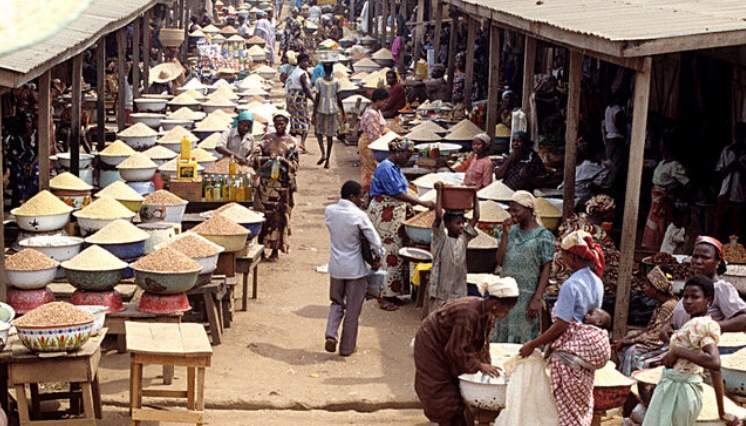
support@yorubalibrary.com
+2348073529208, 07038599574

Yoruba markets are bustling centers of trade and social interaction, playing a vital role in the economy and daily life of the Yoruba people. These markets are not just places to buy and sell goods; they are cultural hubs where traditions are upheld, and community bonds are strengthened. This article explores the significance of Yoruba markets, highlighting some of the most famous ones and their unique characteristics.
The Significance of Yoruba Markets
Yoruba markets are deeply rooted in the history and culture of the Yoruba people. They serve as the primary venues for commerce, providing essential goods and services to the community.
• Economic Importance: Markets are critical to the local economy, offering a platform for traders to sell their products and for consumers to purchase a wide variety of goods. From fresh produce and textiles to handcrafted goods and traditional medicine, Yoruba markets cater to diverse needs.
• Social Interaction: These markets are also social spaces where people gather to catch up, share news, and celebrate cultural events. The market environment fosters a sense of community and belonging.
Famous Yoruba Markets
Several markets stand out in Yoruba land for their size, historical significance, and the variety of goods they offer. Here are a few notable ones:
Balogun Market, Lagos
Balogun Market is one of the largest and busiest markets in Lagos, Nigeria’s commercial capital. It is renowned for its wide range of products and its bustling atmosphere.
• Products Available: Balogun Market is famous for its extensive selection of textiles, clothing, shoes, and accessories. It is a go-to destination for fashion enthusiasts and wholesalers.
• Cultural Significance: The market's name, "Balogun," reflects its historical roots, as Balogun was a title for military leaders in the Yoruba kingdom. Today, it remains a central hub of commerce in Lagos.
Oja Oba Market, Ibadan
Oja Oba Market, located in the heart of Ibadan, is a traditional market with a rich history. It is situated near the palace of the Olubadan, the traditional ruler of Ibadan.
• Products Available: The market offers a wide variety of goods, including fresh produce, meat, fish, traditional herbs, and handcrafted items. It is also known for its sections dedicated to local crafts and traditional clothing.
• Cultural Significance: The proximity to the Olubadan's palace adds to the market's cultural importance, making it a focal point for traditional ceremonies and events.
Oja-Oba Market, Akure
Oja-Oba Market in Akure, the capital of Ondo State, is another significant Yoruba market known for its vibrant trade activities.
• Products Available: This market is renowned for its agricultural products, including yams, cassava, and vegetables. It also features sections for clothing, household items, and traditional medicine.
• Cultural Significance: The market serves as a key economic hub for Akure and its surrounding regions, fostering trade and social cohesion among the people.
Unique Features of Yoruba Markets
Yoruba markets have distinct features that set them apart from other markets. These include their organization, the role of market associations, and the significance of market days.
• Organization and Structure: Yoruba markets are typically organized into sections, each dedicated to specific types of goods. This organization makes it easier for shoppers to find what they need and for traders to specialize in particular products.
• Market Associations: Market traders often belong to associations or guilds that regulate trade practices, settle disputes, and organize collective activities. These associations play a crucial role in maintaining order and promoting fairness in the market.
• Market Days: Many Yoruba markets operate on specific market days, which are often tied to traditional calendars. These days attract larger crowds and more traders, creating a lively atmosphere.
Challenges and Modernization
While Yoruba markets are essential to commerce and culture, they also face challenges, including infrastructure issues, competition from modern retail outlets, and the need for modernization.
• Infrastructure: Many markets struggle with inadequate infrastructure, such as poor drainage, insufficient space, and lack of proper sanitation facilities. Addressing these issues is crucial for improving the market experience.
• Competition: The rise of modern supermarkets and online shopping presents competition for traditional markets. However, the unique cultural and social aspects of Yoruba markets continue to attract shoppers.
• Modernization Efforts: Efforts to modernize markets include upgrading facilities, improving security, and incorporating digital technologies to enhance trade efficiency and customer satisfaction.
Conclusion
Yoruba markets are the heart of commerce in Yoruba land, offering a rich blend of economic activity and cultural heritage. From the bustling Balogun Market in Lagos to the traditional Oja Oba Market in Ibadan, these markets are essential to the daily lives of the Yoruba people. Despite facing modern challenges, Yoruba markets continue to thrive, preserving their historical significance and fostering a sense of community

Learn about the Yoruba concept of Ìwà Pẹ̀lẹ́ (good…

Learn special praises for Divine Being and Creator…